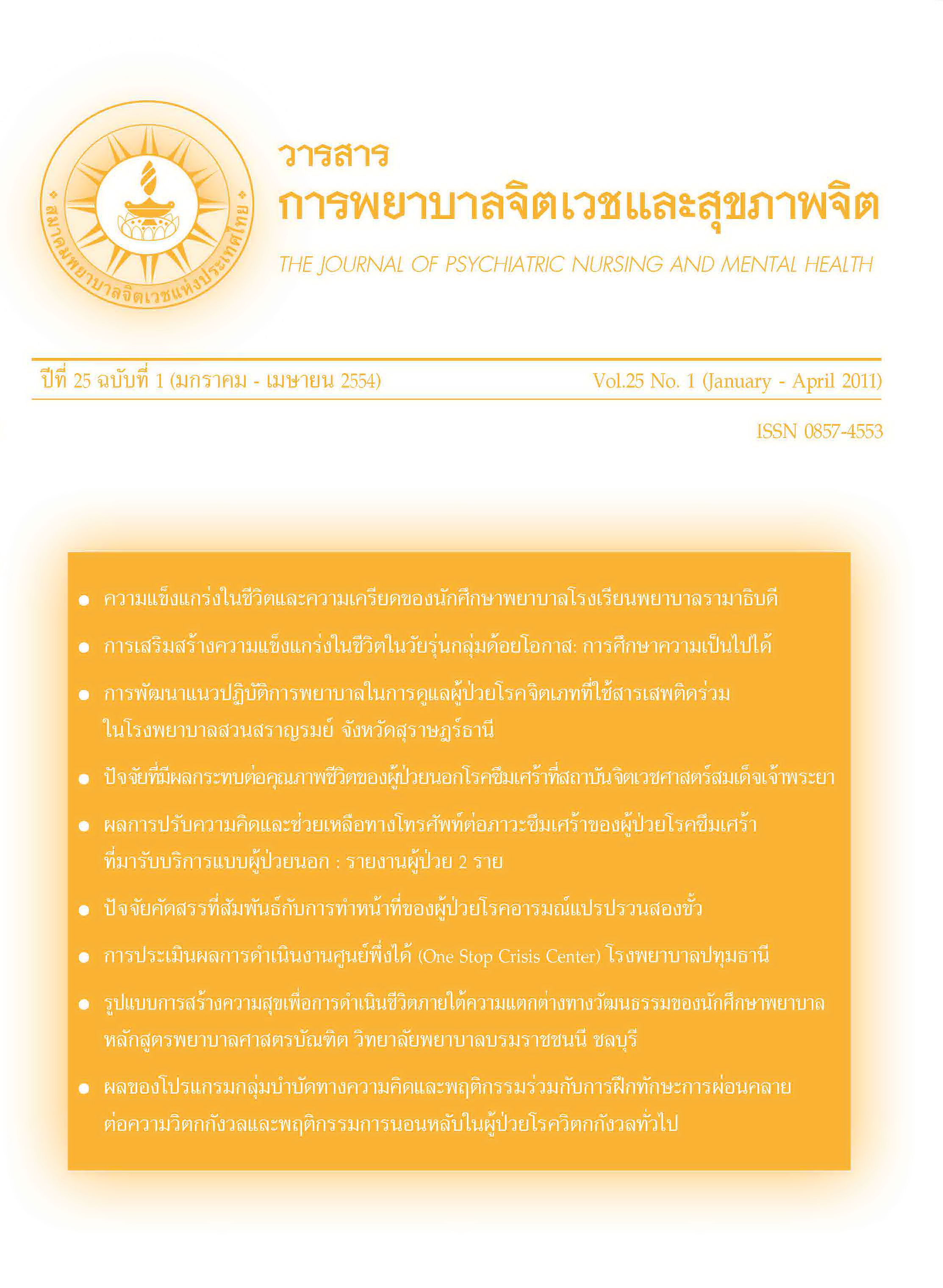ผลของโปรแกรมกลุ่มบำบัดทางความคิดและพฤติกรรมร่วมกับการฝึกทักษะการผ่อนคลาย ต่อความวิตกกังวลและพฤติกรรมการนอนหลับในผู้ป่วยโรควิตกกังวลทั่วไป
Main Article Content
บทคัดย่อ
บทคัดย่อ
การวิจัยกึ่งทดลองครั้งนี้มีวัตถุประสงค์เพื่อ 1) เปรียบเทียบความวิตกกังวลและพฤติกรรม การนอนหลับในผู้ป่วยโรควิตกกังวลทั่วไปก่อน และหลังได้รับโปรแกรมกลุ่มบำบัดทางความคิด และพฤติกรรมร่วมกับการฝึกทักษะการผ่อนคลาย 2) เปรียบเทียบความวิตกกังวลและพฤติกรรม การนอนหลับในผู้ป่วยโรควิตกกังวลทั่วไประหว่าง กลุ่มที่ได้รับโปรแกรมกลุ่มบำบัดทางความคิด และพฤติกรรมร่วมกับการฝึกทักษะการผ่อนคลาย กับกลุ่มที่ได้รับการพยาบาลตามปกติ กลุ่มตัวอย่าง เป็นผู้ป่วยโรควิตกกังวลทั่วไป จำนวน 40 คน จับคู่ ตามเพศ อายุ คะแนนความวิตกกังวล คะแนน พฤติกรรมการนอนหลับ และสุ่มเข้าสู่กลุ่มทดลอง จำนวน 20 คน และกลุ่มควบคุมจำนวน 20 คน เครื่องมือที่ใช้ในการวิจัย คือ 1)โปรแกรมกลุ่ม บำบัดทางความคิดและพฤติกรรมร่วมกับการฝึก ทักษะการผ่อนคลาย 2) แบบวัดความวิตกกังวล ขณะปัจจุบันและแบบวัดความวิตกกังวลประจำตัว 3) แบบวัดพฤติกรรมการนอนหลับ เครื่องมือ ทุกชุดผ่านการตรวจสอบความตรงตามเนื้อหา จากผู้ทรงคุณจำนวน 5 คน เครื่องมือชุดที่ 2 และ 3 มีค่าความเที่ยง Cronbach Alpha เท่ากับ .92, .87 และ .81 วิเคราะห์ข้อมูลโดยใช้สถิติทดสอบที (t-test)
ผลการวิจัยที่สำคัญ สรุปได้ดังนี้
1. ความวิตกกังวลในผู้ป่วยโรควิตกกังวล ทั่วไปหลังได้รับโปรแกรมกลุ่มบำบัดทางความคิดและพฤติกรรมร่วมกับการฝึกทักษะการผ่อนคลาย ต่ำกว่าก่อนได้รับโปรแกรม อย่างมีนัยสำคัญทาง สถิติที่ระดับ .05 ขณะที่พฤติกรรมการนอนหลับ ในผู้ป่วยโรควิตกกังวลทั่วไปหลังได้รับโปรแกรม ดีกว่าก่อนได้รับโปรแกรม อย่างมีนัยสำคัญทาง สถิติที่ระดับ .05
2. ความวิตกกังวลในผู้ป่วยโรควิตกกังวล ทั่วไปที่ได้รับโปรแกรมกลุ่มบำบัดทางความคิด และพฤติกรรมร่วมกับการฝึกทักษะการผ่อนคลาย ต่ำกว่ากลุ่มที่ได้รับการพยาบาลตามปกติ อย่างมี นัยสำคัญทางสถิติที่ระดับ .05 ขณะที่พฤติกรรม การนอนหลับในผู้ป่วยโรควิตกกังวลทั่วไปที่ได้รับ โปรแกรมดีกว่ากลุ่มที่ได้รับการพยาบาลตามปกติ อย่างมีนัยสำคัญทางสถิติที่ระดับ .05
คำสำคัญ : ความวิตกกังวล, โรควิตกกังวลทั่วไป, พฤติกรรมการนอนหลับ, การบำบัดทางความคิดและพฤติกรรม
Abstract
The purpose of this Quasi–experimental research were 1) to compare the anxiety and the sleep behaviors of generalized anxiety disorder patients before and after received the group cognitive behavioral therapy program and relaxation training 2) to compare the anxiety and the sleep behaviors of generalized anxiety disorder patients who received the program and those who received regular caring activities. The 40 samples were generalized anxiety disorder patients. Matched pair characteristics of gender, age, score of anxiety and score of sleep behaviors and then randomly assigned into experimental group and control group, 20 in each group. The research instruments consisted of: 1) The group cognitive behavioral therapy program and relaxation training 2) The State-Trait Anxiety Inventory 3) Sleep behaviors questionnaire. All instruments were validated for content validity by 5 experts. The reliability of the 2nd and 3rd instruments were reported by Cronbach Alpha as of .92, .87 and .81. The t-test was used in data analysis.
Major findings were as follows:
1. The anxiety of generalized anxiety disorder patients after received group cognitive behavioral therapy program and relaxation training was significantly lower than before experiment at the .05 level, whereas the sleep behaviors was significantly better than before experiment, at the .05 level.
2. The anxiety of generalized anxiety disorder patients who received group cognitive behavioral therapy program and relaxation training was significantly lower than those who received the regular carling activities at the .05 level, whereas the sleep behaviors was significantly better than those who received the regular carling activities at the .05 level.
Keywords : Anxiety, Generalized anxiety disorder, Sleep behaviors, Cognitive Behavior Therapy
Article Details
บทความที่ได้รับการตีพิมพ์แล้ว เป็นลิขสิทธิ์ของสมาคมพยาบาลจิตเวชแห่งประเทศไทย


